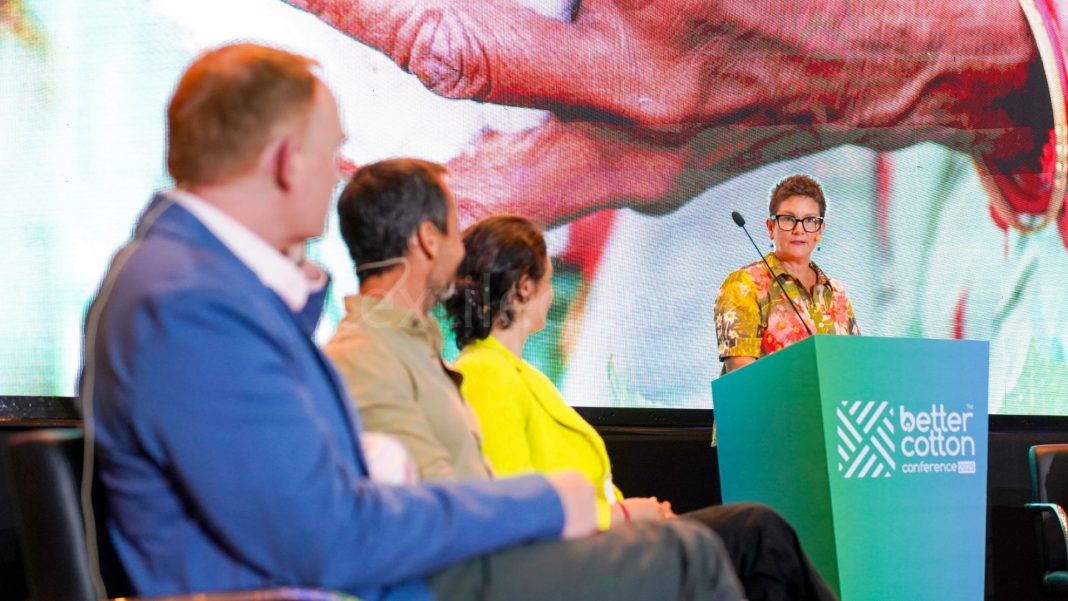The 2025 Better Cotton Conference held in İzmir on June 18-19, placed cotton farmers and field-level organisations front and centre accordingly the event’s theme: ‘It Starts with Farmers’. 284 attendees participated in the conference in person and 114 took part online. The event brought together participants from 29 different countries, with live interpretation available. Over 70 speakers delivered a variety of interactive sessions across the two days. Cotton farmers and field-level partners from all corners of the world participated at the conference, representing Brazil, Côte d’Ivoire, India, Pakistan, the US, Uzbekistan and more.
Better Cotton’s outgoing CEO, Alan McClay, said: “While it takes all of us to create lasting change, real progress must start with farmers. That is the theme for this year’s conference – but it is increasingly the framing that will drive all of Better Cotton’s work moving forward.”
The new CEO and former Executive Director of the International Cocoa Initiative, Nick Weatherill also took the stage and said to McClay by shaking his hand: “You are leaving a very powerful legacy, and I am inheriting a very precious lifeforce. You have my word that I will look after it.”
“Better Cotton will become a regenerative standard within the next year”
On day one, in a session focused on regenerative practices, Better Cotton announced that it will become a regenerative standard within the next year. “While Better Cotton’s field level standard is already recognised to cover many of the core tenets of regenerative agriculture, this move will further ensure that farmers who meet our standard are adopting the most commonly agreed regenerative practices” said Better Cotton’s Senior Director of Demand and Engagement, Eva Benavidez Clayton.
Can traceability benefit farmers?
In a discussion at the conference, debating two teams put on the table the question: ‘Can traceability benefit farmers?’ With Better Cotton representation on both sides, the session sought to highlight the many opportunities and challenges that surround traceability as it relates to farming communities, and explore ways in which solutions can be deployed that involve farmers to ensure they, like other stakeholders reap the rewards of enhanced supply chain transparency.
After a fiercely-contested conversation, the audience in attendance cast their votes and a verdict was reached: traceability can indeed benefit farmers.

“Farmers should not be burdened with endless data demands without seeing real benefits”
One of the panelists, Pallavi Sharma, Food, agriculture and biodiversity lead at Global Rights Compliance shared a post after the conference on her social media account. Here, Sharma asked if farmers actually benefit from the data they provide and said: “Tracking cotton back to the farm should open better opportunities for farmers. But right now, it often feels like brands get most of the benefits. For traceability to work, it has to be a two-way street. Farmers shouldn’t be burdened with endless data demands without seeing real benefits. Tools need to be simple, in local languages, designed with farmers in mind, and farmers need to have a share in the value where their data is being used.”
She also mentioned on economic benefits for farmers, pointing out that monetary incentives remain the biggest driver for transitioning to better, more sustainable farming across the supply chain.
“Without clear laws, progress will be slow and uneven”
Pallavi Sharma underlined that standards like Better Cotton do important work, but without clear laws, progress will be slow and uneven: “That said, as I said on the panel, let’s not miss the forest for the trees. Even if some rules are weakening, ignoring people and the planet isn’t smart. Courts and customers notice. Cutting corners might save money now, but it can cost us big time later, as supply chains become less resilient to climate shocks and other disruptions.”
Better Cotton’s first-ever US Impact Report is launched
During the conference’s final session on the power of cross-commodity collaboration, Eva Benavidez Clayton announced the launch of the organisation’s first-ever US Impact Report. The report reflects on the past decade (2014-2024) of Better Cotton’s progress and presence in the United States. It introduces the US programme and its partners, provides a snapshot of large-scale cotton farming in the US and paints a more complete picture of the US cotton landscape.
The conference closed with two field trips, providing attendees with the chance to directly interact with the cotton supply chain. With one group travelling to Tanmanlar Farm to learn about regenerative practices, and another discovering production processes at Uçak Tekstil’s ginner and spinning mill facilities, participants heard first-hand the challenges and opportunities that the sector is facing.
